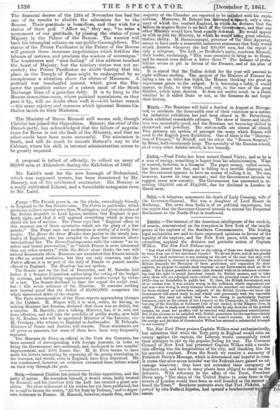frame. — The French press is, on the whole, exceedingly friendly
, to England in the San Jacinto case. ThePatrie in particular, which professes tolhave special news from Washington, and gives sketches of the British despatch to Lord Lyons, declares that England is per- fectly right, and that it will applaud everything which is done to shield the law of nations. The Prase says that "England offers at this moment one of those spectacles which are the glory of a free people." The Temps says our moderation is worthy of a really free people. The .Revue des Deux Mendes doesjustice to the steady neu- trality of England, who has scrupled to place her interests above international law. The Revue Conlemporaine calls the seizure "an in- solent and brutal provocation," in "which France is more interested than any other country," while the Siècle alone thinks the war will extend democratic ideas. Rumours are circulated that France intends to offer an armed mediation, but they are only rumours, and the Parie affirms it is no part of the duty of France to punish insults offered to England. The Moniteur has not spoken. The Senate met on the 2nd of December, and M. Baroche laid before it a Senates Consultum authorizing the voting of the budget by sections, and forbidding supplementary credits except by virtue of a law. The Senate declined to hear the expose des motifs read, but it fills seven columns of the Moniteur. It contains nothing new beyond proof that the deficit of 40,000,0001. comprises the whole uncovered debts of the empire.
The Paris correspondent of the Times reports approaching changes in the Cabinet. M. Magne will, it is said, retire, he having, as talking Minister last Session, declared that there was no deficit, but a surplus. M. Baroche, also a talking Minister, has, it is said, not been effective, and will take the portfolio of public works, now held by M. Roulier, who will be appointed Minister of the Interior, vice M. Persigny, who returns to England as Ambassador. M. Delangle, Minister of Grace and Justice, will remain. These statements are all given as rumours, but some of them have been very frequently repeated.
The Marquis de Flers, an official in the Cour des Comptes, has been accused of corresponding with foreign journals, in order to i bring the Government into contempt, and sentenced to two months' imprisonment, and 2000 francs fine. M. de Fleas seems to have made his letters interesting by repeating all the gossip circulating in i
the bureaux, and would, even in England, have been dismissed. "He was condemned, however, on evidence extracted from letters seized on their way through the post.






























 Previous page
Previous page